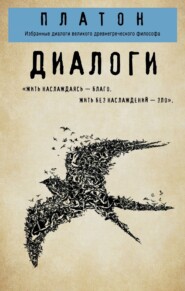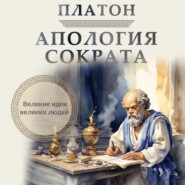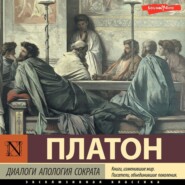По всем вопросам обращайтесь на: info@litportal.ru
(©) 2003-2024.
✖
Phaedo
Настройки чтения
Размер шрифта
Высота строк
Поля
And that these admissions were not unfair, Cebes, he said, may be shown, I think, as follows: If generation were in a straight line only, and there were no compensation or circle in nature, no turn or return of elements into their opposites, then you know that all things would at last have the same form and pass into the same state, and there would be no more generation of them.
What do you mean? he said.
A simple thing enough, which I will illustrate by the case of sleep, he replied. You know that if there were no alternation of sleeping and waking, the tale of the sleeping Endymion would in the end have no meaning, because all other things would be asleep, too, and he would not be distinguishable from the rest. Or if there were composition only, and no division of substances, then the chaos of Anaxagoras would come again. And in like manner, my dear Cebes, if all things which partook of life were to die, and after they were dead remained in the form of death, and did not come to life again, all would at last die, and nothing would be alive – what other result could there be? For if the living spring from any other things, and they too die, must not all things at last be swallowed up in death? (But compare Republic.)
There is no escape, Socrates, said Cebes; and to me your argument seems to be absolutely true.
Yes, he said, Cebes, it is and must be so, in my opinion; and we have not been deluded in making these admissions; but I am confident that there truly is such a thing as living again, and that the living spring from the dead, and that the souls of the dead are in existence, and that the good souls have a better portion than the evil.
Cebes added: Your favorite doctrine, Socrates, that knowledge is simply recollection, if true, also necessarily implies a previous time in which we have learned that which we now recollect. But this would be impossible unless our soul had been in some place before existing in the form of man; here then is another proof of the soul's immortality.
But tell me, Cebes, said Simmias, interposing, what arguments are urged in favour of this doctrine of recollection. I am not very sure at the moment that I remember them.
One excellent proof, said Cebes, is afforded by questions. If you put a question to a person in a right way, he will give a true answer of himself, but how could he do this unless there were knowledge and right reason already in him? And this is most clearly shown when he is taken to a diagram or to anything of that sort. (Compare Meno.)
But if, said Socrates, you are still incredulous, Simmias, I would ask you whether you may not agree with me when you look at the matter in another way; – I mean, if you are still incredulous as to whether knowledge is recollection.
Incredulous, I am not, said Simmias; but I want to have this doctrine of recollection brought to my own recollection, and, from what Cebes has said, I am beginning to recollect and be convinced; but I should still like to hear what you were going to say.
This is what I would say, he replied: – We should agree, if I am not mistaken, that what a man recollects he must have known at some previous time.
Very true.
And what is the nature of this knowledge or recollection? I mean to ask, Whether a person who, having seen or heard or in any way perceived anything, knows not only that, but has a conception of something else which is the subject, not of the same but of some other kind of knowledge, may not be fairly said to recollect that of which he has the conception?
What do you mean?
I mean what I may illustrate by the following instance: – The knowledge of a lyre is not the same as the knowledge of a man?
True.
And yet what is the feeling of lovers when they recognize a lyre, or a garment, or anything else which the beloved has been in the habit of using? Do not they, from knowing the lyre, form in the mind's eye an image of the youth to whom the lyre belongs? And this is recollection. In like manner any one who sees Simmias may remember Cebes; and there are endless examples of the same thing.
Endless, indeed, replied Simmias.
And recollection is most commonly a process of recovering that which has been already forgotten through time and inattention.
Very true, he said.
Well; and may you not also from seeing the picture of a horse or a lyre remember a man? and from the picture of Simmias, you may be led to remember Cebes?
True.
Or you may also be led to the recollection of Simmias himself?
Quite so.
And in all these cases, the recollection may be derived from things either like or unlike?
It may be.
And when the recollection is derived from like things, then another consideration is sure to arise, which is – whether the likeness in any degree falls short or not of that which is recollected?
Very true, he said.
And shall we proceed a step further, and affirm that there is such a thing as equality, not of one piece of wood or stone with another, but that, over and above this, there is absolute equality? Shall we say so?
Say so, yes, replied Simmias, and swear to it, with all the confidence in life.
And do we know the nature of this absolute essence?
To be sure, he said.
And whence did we obtain our knowledge? Did we not see equalities of material things, such as pieces of wood and stones, and gather from them the idea of an equality which is different from them? For you will acknowledge that there is a difference. Or look at the matter in another way: – Do not the same pieces of wood or stone appear at one time equal, and at another time unequal?
That is certain.
But are real equals ever unequal? or is the idea of equality the same as of inequality?
Impossible, Socrates.
Then these (so-called) equals are not the same with the idea of equality?
I should say, clearly not, Socrates.
And yet from these equals, although differing from the idea of equality, you conceived and attained that idea?
Very true, he said.
Which might be like, or might be unlike them?
Yes.
But that makes no difference; whenever from seeing one thing you conceived another, whether like or unlike, there must surely have been an act of recollection?
Very true.
But what would you say of equal portions of wood and stone, or other material equals? and what is the impression produced by them? Are they equals in the same sense in which absolute equality is equal? or do they fall short of this perfect equality in a measure?
Yes, he said, in a very great measure too.
And must we not allow, that when I or any one, looking at any object, observes that the thing which he sees aims at being some other thing, but falls short of, and cannot be, that other thing, but is inferior, he who makes this observation must have had a previous knowledge of that to which the other, although similar, was inferior?
Certainly.
And has not this been our own case in the matter of equals and of absolute equality?
Precisely.

















